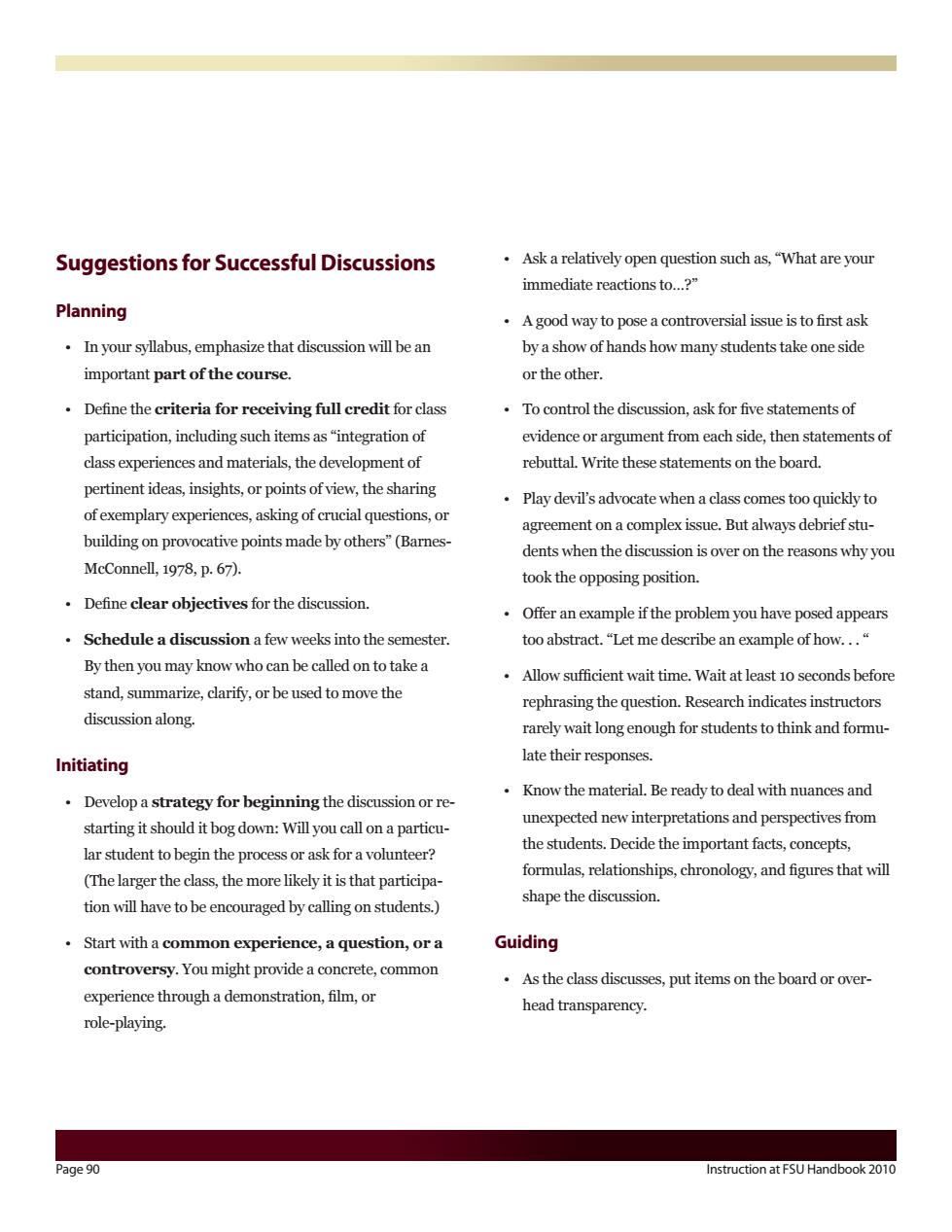正在加载图片...

Suggestions for Successful Discussions Ask a relatively open question such as."What are your immediate reactions to..?" Planning .Agood way to pose a controversial issue is to first ask .In your syllabus,emphasize that discussion will be an by a show of hands how many students take one side important part of the course. or the other. Define the criteria for receiving full credit for class To control the discussion.ask for five statements of participation,including such items as"integration of evidence or argument from each side,then statements of class experiences and materials,the development of rebuttal.Write these statements on the board. pertinent ideas,insights.or points of view,the sharing Play devil's advocate when a class comes too quickly to of exemplary experiences,asking of erucial questions,or agreement on a complex issue.But always debrief stu- building on provocative points made by others"(Barnes- dents when the discussion is over on the reasons why you McConnell,1978,p.67). took the opposing position. Define clear objectives for the discussion. Offer an example if the problem you have posed appears Schedule a discussion a few weeks into the semester. too abstract."Let me describe an example of how..." By then you may know who can be called on to take a Allow sufficient wait time.Wait at least 10 seconds before stand,summarize,clarify,or be used to move the rephrasing the question.Research indicates instructors discussionalong. rarely wait long enough for students to think and formu- Initiating late their responses. Develop a strategy for beginning the discussion or re- Know the material.Be ready to deal with nuances and starting it should it bog down:Will you call on a particu unexpected new interpretations and perspectives from the students.Decide the important facts,concepts, lar student to begin the process or ask for a volunteer? (The larger the class,the more likely it is that participa formulas,relationships,chronology,and figures that will shape the discussion. tion will have to be encouraged by calling on students.) Start with a common experience,a question,or a Guiding controversy.You might provide a concrete,common experience through a demonstration,film,or .As the class discusses,put items on the board or over- head transparency. role-playing. age 90 Instruction at FSU Handbook 2010Page 90 Instruction at FSU Handbook 2010 Suggestions for Successful Discussions Planning • In your syllabus, emphasize that discussion will be an important part of the course. • Define the criteria for receiving full credit for class participation, including such items as “integration of class experiences and materials, the development of pertinent ideas, insights, or points of view, the sharing of exemplary experiences, asking of crucial questions, or building on provocative points made by others” (BarnesMcConnell, 1978, p. 67). • Define clear objectives for the discussion. • Schedule a discussion a few weeks into the semester. By then you may know who can be called on to take a stand, summarize, clarify, or be used to move the discussion along. Initiating • Develop a strategy for beginning the discussion or restarting it should it bog down: Will you call on a particular student to begin the process or ask for a volunteer? (The larger the class, the more likely it is that participation will have to be encouraged by calling on students.) • Start with a common experience, a question, or a controversy. You might provide a concrete, common experience through a demonstration, film, or role-playing. • Ask a relatively open question such as, “What are your immediate reactions to…?” • A good way to pose a controversial issue is to first ask by a show of hands how many students take one side or the other. • To control the discussion, ask for five statements of evidence or argument from each side, then statements of rebuttal. Write these statements on the board. • Play devil’s advocate when a class comes too quickly to agreement on a complex issue. But always debrief students when the discussion is over on the reasons why you took the opposing position. • Offer an example if the problem you have posed appears too abstract. “Let me describe an example of how. . . “ • Allow sufficient wait time. Wait at least 10 seconds before rephrasing the question. Research indicates instructors rarely wait long enough for students to think and formulate their responses. • Know the material. Be ready to deal with nuances and unexpected new interpretations and perspectives from the students. Decide the important facts, concepts, formulas, relationships, chronology, and figures that will shape the discussion. Guiding • As the class discusses, put items on the board or overhead transparency